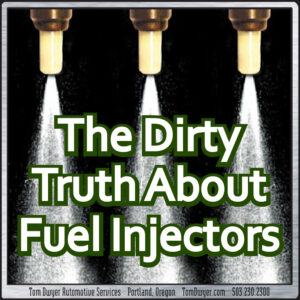
If done right, fuel injector cleaning can be worth it.
Is your vehicle running rough and getting steadily worse? Is your Check Engine light on? Have you been told your fuel injectors need to be cleaned? Clean fuel injectors are critical to proper engine function and efficiency, so fuel injector cleaning is definitely a valid service. But over the years we’ve had many clients who’ve been sold fuel injection cleaning services, most often by convenience oil change shops, in what seem to us a deceptive way. Knowing what your fuel injectors do, why they’re important, and how they’re cleaned can keep you from paying for this service if it’s not really necessary, and get the most benefit when it is…
Didn’t I used to have a carburetor?
Both carburetors and fuel injectors control fuel flow to your engine cylinders. Carburetors supply fuel to all the cylinders at the same rate, but fuel injectors precisely tailor the flow to each individual cylinder for smoother, more consistent engine operation, better fuel efficiency, and lower emissions. This real-time precision monitoring only became possible with the advent of vehicle computer-control systems.
While fuel injection for aircraft goes back to 1902, it first appeared in race cars in the 1950’s and became ubiquitous in consumer vehicles in the 1980’s. The last production cars with a carburetor (the Subaru Justy, Jeep Grand Wagoneer, Ford Crown Victoria, or Honda Prelude, depending on your source) rolled off the line in 1990-91. Unless you’re a true die-hard, your vehicle has fuel injection.
How fuel injectors work
Fuel injectors pressurize fuel and pump it through either a fixed or electronically-controlled aperture, delivering the fuel as a fine, cone-shaped spray of mist to the engine. Mist is easier to ignite than a solid stream of liquid and it burns more evenly and efficiently. Over time, deposits from the burning fuel build up in the aperture, decreasing the injector’s performance and turning the fine mist into an inconsistent dribble.
Symptoms of clogged injectors
Symptoms of dirty fuel injectors may include:
Hard starting Rough idle
Throttle “tip-in” hesitation Poor overall performance
Pre-ignition (sometimes described as ‘that pinging sound’) Decreased gas mileage
How to know if your injectors need cleaning
Clogged fuel injectors certainly cause the symptoms above, but so do a host of other issues. How do you know if it’s the injectors? Unfortunately, the spray tips of fuel injectors can’t be seen with the engine intact and it takes well over an hour to get to them for examination, so injector maintenance is best done on time and mileage intervals instead of direct inspection.
We recommend fuel injector cleaning at least every 36 months or 45,000 miles unless they’re already showing symptoms of being clogged. Cleaning removes gunk, but they can’t fix a cracked or mechanically damaged unit. Fuel injectors can be cleaned many times, but eventually they do wear out and will need full replacement. You can expect to clean injectors 2-3 times before they’ll need to be fully replaced.
Consider it a tune up for your fuel system- it’s really amazing the difference people experience after having a fuel injection and throttle body cleaning on a car that has gone more than 60,000 miles without those services! Many engine parts can be replaced without noticeable performance changes, but when dirty injectors are cleaned there’s almost always a distinct before-and-after difference!
How to keep your injectors clean between professional services
There are plenty of “cure-in-a-can” fuel system products, but you shouldn’t waste money or risk engine damage from them. The only do-it-yourself fuel system cleaner we’ve found that works and won’t damage your car is Chevron’s Techron. We don’t mean the low level put in fuel at gas stations;, it also comes in a 20oz bottle that pours straight into the gas tank.
For real benefit, Techron must be used at least every 4,000 miles or so, but even when used properly, Techron doesn’t work as well as professional-grade cleaning systems. Your injectors will still need to be properly cleaned eventually. 2004-and-newer vehicles are likely to need fuel injectors cleaning less often because newer designs and today’s better fuel additives reduce fouling. Pre-2004 models can benefit from high quality fuel, as this decreases (but doesn’t eliminate) the need for periodic injector cleaning.
How to clean your injectors properly
There are two basic ways shops clean your fuel injectors; cleaning with canned solvent and solvent recirculation.
In the first method, a mechanic removes the injectors and sprays or soaks them in solvent, a higher grade of the same stuff you could get at any auto parts store. It’s the process most often used by convenience lube places and we recommend you avoid it. It doesn’t clean the entire fuel system and the surface solvent doesn’t penetrate into the injector deeply enough to get all the deposits. It is a method from years past and, and any difference is usually marginal and short-lived.
We highly recommend commercial-grade systems for the thorough cleaning you need. Ours is a MotorVac, which cycles a pressurized flow of cleaner directly through the entire fuel injection system. The cleaner flushes the fuel rail and pressure regulator to remove insoluble material from the injector inlet screens, before cleaning the injector ports. The whole fuel rail (injectors, screens, hoses, and regulator) is scrubbed clean first, and then the engine is run for about 30 minutes to clean the injector nozzles.
Our worries about convenience lube shops
Convenience oil change places have, in our opinion, a shaky business model. They bring in customers with money-losing deals on oil changes, but make the money back by “upselling” other, more expensive, services that may or may not be in the customer’s best interests. Their ‘advisors’ are paid on commission so their only goal is to sell as much as the customer will buy. These places take no responsibility for the long term operation of the vehicle or the customer’s priorities.
Fuel Injector Cleaning is a popular upsell because your injectors actually DO need to be cleaned sometimes, and the ‘fix’ the convenience shop has to offer is expensive and quick. Great from the lube joint’s point-of-view, but the cleaning you’ll get isn’t usually worth the cost.
If your vehicle isn’t at the correct mileage, you may still be recommended a cleaning to deal with vehicle performance issues. Unfortunately, many issues that suggest injector cleaning could also be caused by other problems, and few lube shops have the equipment or trained technicians to diagnose mechanical failures. Injector cleaning is a very expensive way to start narrowing down problems.
Finally, convenience shops are not equipped to deal with the very real problems that may crop up during injector cleaning. You should avoid buying a injection cleaning service from any shop that can’t test your fuel pressure, diagnose or replace a damaged fuel injector, or offer any of the other services you might need as well… or instead.
Take your time, do it right
If a convenience lube shop, a well-meaning relative, or even another shop recommends you get your fuel injectors cleaned, take it as just that… a recommendation. Ask why they suggested it, and if you actually DO need the cleaning, make sure the facility has the best equipment and the expertise to do the job right… it’s a waste of your time and money to do it wrong!
Digging Deeper…
9 Symptoms of a Bad Fuel Injector (and Cleaning/Replacement Cost), CarTreatments.com, updated Jun 2020
What Was the Last Car in America Sold With a Carburetor?, Aaron Gold in Autotrader, Jan 2017










